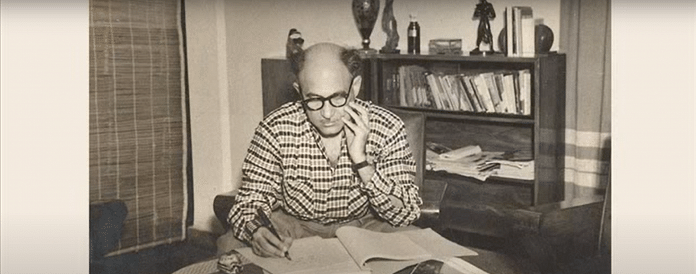A versatile and progressive writer, socialist, film critic and filmmaker — Khwaja Ahmad Abbas was so much more than the man who wrote Raj Kapoor’s best movies or gave Amitabh Bachchan his break. Before he turned to films, K.A. Abbas was a novelist, short-story writer, playwright and a columnist.
In most of the video footage of the writer-filmmaker and recordings from documentaries on his life, he’s speaking about his dreams and ideals or hunched over his desk and writing furiously. In one such documentary, he is described as “looking for an ideal reality … He keeps searching for it sometimes in drama, stories and novels … sometimes in politics, journalism, dialogues and even in scripts”.
With works spanning 74 books, 90 short stories, 3,000 journalistic articles, 40 films and some plays, Abbas was not just a jack of all trades but king of them all too. He started out as a journalist for Bombay Chronicle, then a columnist for the Blitz and finally ventured off into feature films. He was one of the initial members of the Indian People’s Theatre Association (IPTA), along with Balraj Sahni, Utpal Dutt and Prithviraj Kapoor.
During his stint in Hindi cinema, he directed classics like Dharti Ke Lal (1946), based on the Bengal famine of 1943, and later bagged National Film Awards for Shehar Aur Sapna (1963), Do Boond Pani (1971) and Saat Hindustani (1969), the film that saw Amitabh Bachchan debut on screen. Abbas was awarded a Padma Shri in 1969 and Palme d’Or (Grand Prize) at the Cannes Film Festival for his screenplay for Neecha Nagar (1946), among others.
On Abbas’ 106th birth anniversary, ThePrint takes a look at how he traversed different forms of film and writing and held on to his socialist and Gandhian values.
Also read: Raj Kapoor’s Awara is all the more relevant in the context of India’s migrant crisis
Blood of revolutionaries and littérateur
Born on 7 June 1914 in Panipat, Haryana, Khwaja Ahmad Abbas hailed from a prominent family. His paternal grandfather, Khwaja Ghulam Abbas, was part of the 1857 revolt against the British, and “the first martyr of Panipat, who was blown from the mouth of a cannon,” writes researcher Showkat Hussain Itoo. This would explain his later affinity for the freedom movement and Mahatma Gandhi’s ideals. Meanwhile, his maternal grandfather was the “chief protege of distinguished Urdu poet Mirza Asadullah Khan Ghalib”, which would later explain his affinity for the pen.
Abbas was home-schooled as a child and then attended Hali Muslim High School in Panipat. In 1933, he graduated from Aligarh Muslim University with a B.A in English Literature in 1933 and then in 1935, with a Bachelor of Laws (L.L.B).
Later, when many in his family migrated to Pakistan after Partition, Abbas chose to stay in India. He was deeply moved by the freedom struggle and ideas of secularism and greatly impressed by Mahatma Gandhi and Jawaharlal Nehru in particular.
Incidentally, in 1939, he wrote a letter to Gandhi asking him to reevaluate his stance on cinema as an ‘evil art’. “You are a great soul, Bapu. In your heart there is no room for prejudice. Give this little toy of ours, the cinema, which is not so useless as it looks, a little of your attention and bless it with a smile,” he wrote.
Also read: Basu Chatterjee told simple, heartfelt stories that had no heroes, only people like us
Influenced by socialism and Gandhian values
Abbas’ sociopolitical consciousness was inspired by socialism. He frequently visited Moscow and his later filmmaking was also inspired by Soviet filmmakers like Sergei Eisenstein and Vsevolod Pudovkin. Pardesi (1957), a joint venture between Abbas’ film production house Naya Sansar and a Moscow film production company, told the story of a 15th-century Russian trader (played by Oleg Strizhenov) who travels to India and falls in love with a local girl (played by Nargis Dutt).
Equality was another thing he held dear, as explained by Amitabh Bachchan in a foreword to Abbas’ memoir, I am Not an Island, An Experiment in Autobiography. The actor wrote how the entire cast and crew of Saat Hindustani travelled in a third-class train compartment to Goa (as it was all that was affordable) and everyone slept on the floor of a government guest house as equals.
It can also be argued that Abbas echoed the ‘veil of ignorance’, a theory of equality propounded by John Rawls. The veil of ignorance suggests decisions about social justice can only be made fairly if made by a person without knowing what position they occupy in that society. In short, equality is about empathy and whether you can step into another’s shoes.
A good example is Saat Hindustani, in which the casting of the seven freedom fighters followed this tenet. In fact, Amitabh Bachchan once explained how he was given the role of a Muslim because Abbas consciously gave every actor a role starkly different from their own identity.
Also read: Kaagaz Ke Phool is Guru Dutt’s masterclass in filmmaking and heartbreak
A sharp critic
Abbas left Aligarh in 1936 and joined the Bombay Chronicle as a journalist. He was very much in tune with the crusades for freedom of press and against imperialism at the time. He regularly poo-pooed films in his column, arguing that the industry lacked good screenplays.
At one point, his scathing reviews led film producers to boycott the newspaper so long as Abbas was a film critic. Abbas was eventually given a higher position but later joined Blitz, where he continued his iconic column from Chronicle, called Last Page, till his death in 1987, all the while writing and directing movies that had a strong message.
Also read: Raat Aur Din, directed by Satyen Bose, was the perfect swansong for Nargis



